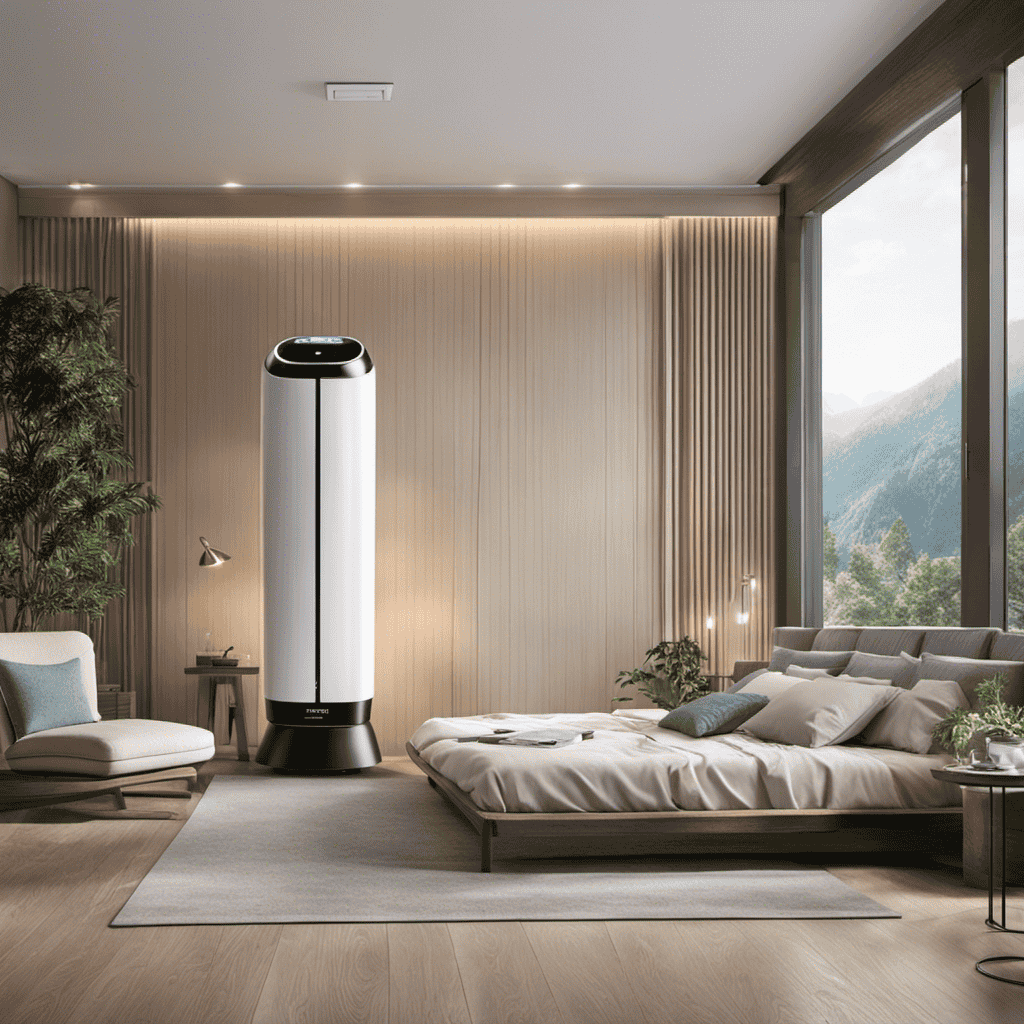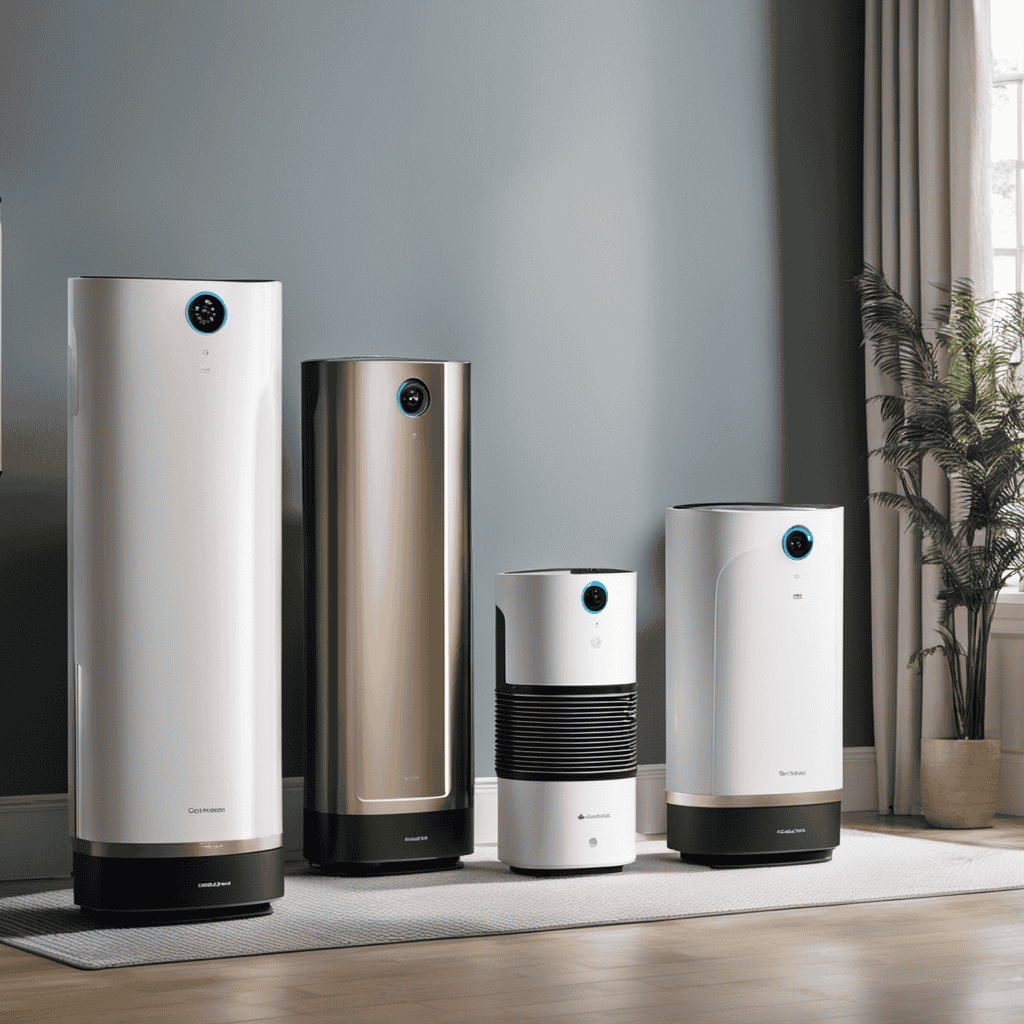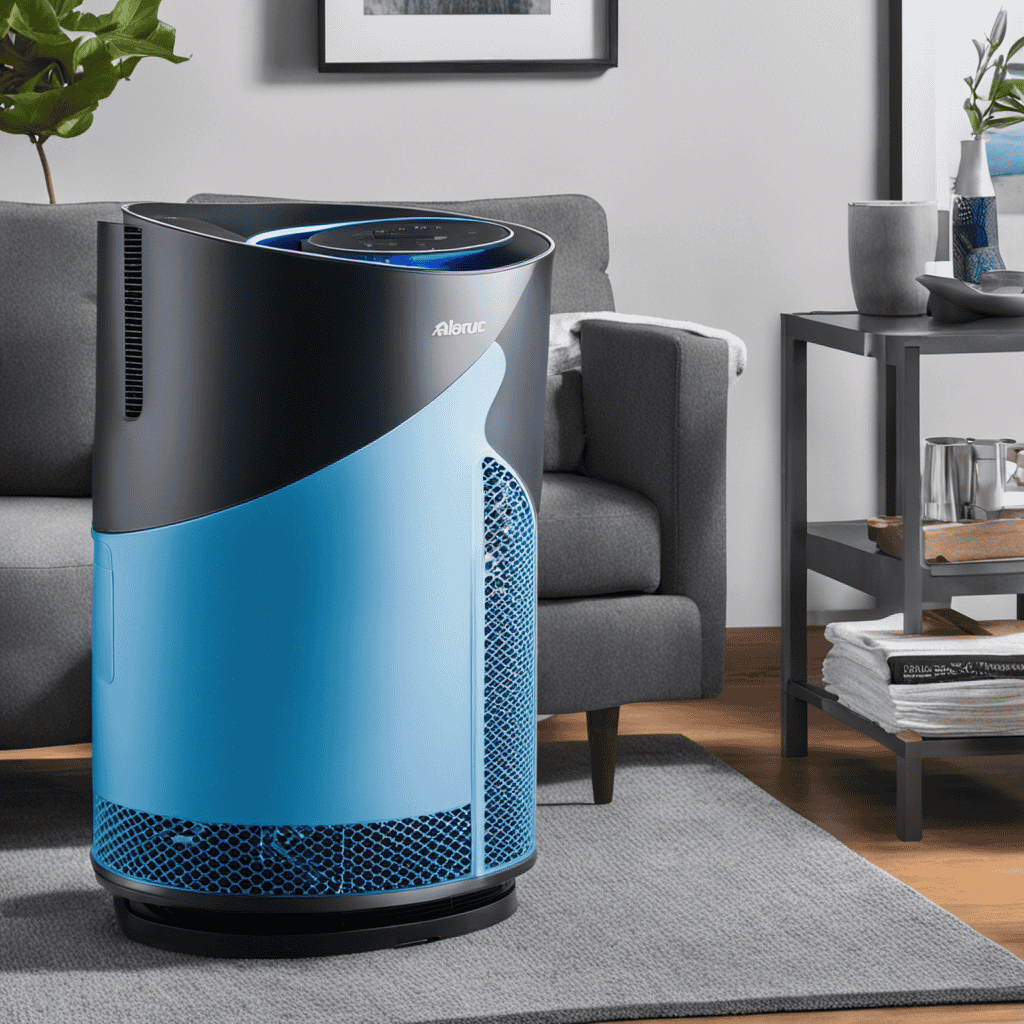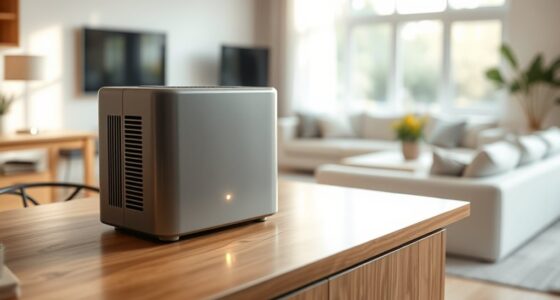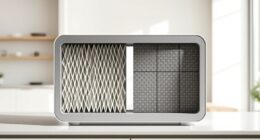I have been searching for the perfect solution to enhance the air quality in my home. I must say, it has been quite a journey.
In my pursuit, I’ve come across two contenders: air purifiers and humidifiers. Both claim to do wonders, but which one is truly the best?
In this article, we’ll dive into the benefits, advantages, and key factors to consider when choosing between an air purifier and a humidifier.
So, buckle up and get ready to breathe easier!
Key Takeaways
- Air purifiers improve air quality and reduce allergies by capturing and eliminating harmful particles.
- Humidifiers maintain optimal humidity levels, preventing dryness, respiratory issues, and improving respiratory health.
- Factors to consider when choosing an air purifier include size, type of filter, noise level, and specific needs.
- Key features to look for in a humidifier include size and capacity, mist output control, ease of maintenance, and prevention of mold and mildew growth.
Benefits of Using an Air Purifier
Using an air purifier can greatly improve the air quality in your home, making it easier to breathe and reducing allergies.
When comparing an air purifier to plants, it is important to note that while plants can help to filter the air, they may not be as effective as an air purifier in removing pollutants and allergens.
Air purifiers are specifically designed to capture and eliminate harmful particles such as dust, pollen, pet dander, and smoke.
On the other hand, air fresheners simply mask odors without actually purifying the air. They may contain chemicals that can be harmful when inhaled, especially for individuals with respiratory conditions.
In contrast, air purifiers work by using filters or technologies like HEPA (High Efficiency Particulate Air) filters to trap and remove pollutants, ensuring cleaner and healthier air for you and your family.
Advantages of Having a Humidifier
To improve the quality of the air in your home, consider having a humidifier. It can offer several advantages.
-
Maintains Optimal Humidity Levels: A humidifier helps regulate and maintain proper humidity levels in your home. This prevents air from becoming too dry or too moist.
-
Prevents Dryness: Dry air can lead to dry skin, irritated eyes, and even respiratory issues. A humidifier adds moisture to the air, alleviating these problems.
-
Improves Respiratory Health: Proper humidity levels can soothe dry airways and help alleviate symptoms of allergies, asthma, and colds.
-
Reduces Static Electricity: Dry air often leads to static electricity, resulting in annoying shocks from everyday objects. A humidifier can significantly reduce static, making your home more comfortable.
Having a humidifier in your home can improve your respiratory health and maintain optimal humidity levels. It provides numerous benefits for both you and your family.
Factors to Consider When Choosing an Air Purifier
When choosing an air purifier, you should consider factors such as size, filter type, and noise level. Air purifier filters are crucial for trapping and removing pollutants from the air. HEPA filters, for example, are highly effective in capturing particles as small as 0.3 microns.
Noise level comparison is also important, especially if you plan to use the air purifier in your bedroom or office where quietness is essential. Look for models that have a low noise level rating, typically measured in decibels (dB). A quiet air purifier will ensure a peaceful environment while still providing clean air.
Now, let’s move on to the key features to look for in a humidifier.
Key Features to Look for in a Humidifier
When choosing a humidifier, there are several key features to consider.
First, you’ll want to look at the size and capacity of the unit. This will determine how much moisture it can release into the air and how long it can run before needing to be refilled.
Secondly, mist output control is an important factor to consider. It allows you to adjust the level of humidity in your space to meet your specific needs.
Lastly, ease of maintenance is a crucial consideration. You’ll want a humidifier that is easy to clean and maintain for optimal performance and longevity.
Size and Capacity
The larger the size and capacity of the air purifier or humidifier, the more effective it will be in improving the air quality in a room. When considering the size and capacity of these devices, two important factors to keep in mind are portability and noise level.
Portability:
- Look for air purifiers or humidifiers that are lightweight and compact, making them easy to move from room to room.
- Consider models with built-in handles or wheels for added convenience.
Noise Level:
- Check the decibel rating of the device to ensure it operates quietly.
- Look for features like a sleep mode or whisper-quiet operation for silent use during nighttime.
Mist Output Control
To control the mist output, adjust the settings on your device according to your desired level of humidity. Most air purifiers and humidifiers come with mist control options that allow you to regulate the amount of moisture released into the air.
This is important, as excessive humidity can lead to mold and mildew growth, while insufficient humidity can cause dryness and discomfort.
When it comes to allergies, mist control is crucial. High humidity levels can create a breeding ground for dust mites and mold spores, triggering allergic reactions. On the other hand, low humidity can cause nasal passages to dry out, making it easier for allergens to enter the body.
Ease of Maintenance
Maintaining your device is made easier with regular cleaning and filter replacements. Taking care of your air purifier or humidifier not only ensures optimal performance but also extends its lifespan. Here are some key points to consider when it comes to the ease of maintenance:
-
Cleaning frequency:
-
Regular cleaning is essential to prevent the buildup of dirt, dust, and other particles that can clog the device and reduce its efficiency.
-
Depending on the model, the recommended cleaning frequency may vary. It’s important to consult the manufacturer’s guidelines for specific instructions.
-
Cost of maintenance:
-
The cost of maintenance includes the price of replacement filters or cartridges, as well as any additional cleaning products or accessories.
-
It’s important to factor in the cost of maintenance when choosing between different models, as it can vary significantly.
Comparing the Effectiveness of Air Purifiers and Humidifiers
When comparing air purifiers and humidifiers, it’s important to evaluate their effectiveness.
One aspect to consider is the cost comparison between the two. Air purifiers tend to be more expensive upfront, with prices ranging from $100 to $500, depending on the brand and features. On the other hand, humidifiers are generally more affordable, with prices ranging from $30 to $200.
Another factor to consider is the energy consumption difference. Air purifiers typically consume less energy compared to humidifiers. This is because air purifiers only need to operate a fan and filters to clean the air, while humidifiers require the use of a heating element or ultrasonic technology to release moisture into the air.
Overall, when evaluating effectiveness, it’s important to consider both cost and energy consumption differences between air purifiers and humidifiers.
Which One Should You Choose: Air Purifier or Humidifier?
When deciding between an air purifier and a humidifier, it’s essential to consider the impact on air quality improvement and the potential health benefits.
An air purifier works by removing particles and pollutants from the air, resulting in cleaner and healthier indoor air.
On the other hand, a humidifier adds moisture to the air, which can alleviate dryness and respiratory issues.
Understanding these key points can help make an informed decision on whether to prioritize air quality improvement or health benefits when choosing between an air purifier and a humidifier.
Air Quality Improvement
To improve the air quality in your home, consider using an air purifier or a humidifier. Both options have their benefits, so it’s important to understand the differences. Here are some key points to consider:
-
Air purifier vs. plants:
-
Air purifiers are designed to remove pollutants and allergens from the air, whereas plants can help improve air quality by absorbing carbon dioxide and releasing oxygen.
-
While plants can be a natural and aesthetically pleasing option, air purifiers are typically more effective at removing harmful particles from the air.
-
Air purifiers and allergies:
-
Air purifiers with HEPA filters can trap pollen, pet dander, and other allergens, providing relief for allergy sufferers.
-
Plants may help reduce certain allergens, but they are not as reliable in removing them as air purifiers.
Considering your specific needs and the quality of air in your home, it’s recommended to choose the option that best suits your situation.
Health Benefits Comparison
Using an air purifier or a humidifier can have various health benefits that are worth considering. Both devices can help improve the air quality in your home and provide relief from allergies and respiratory issues. However, the specific benefits of each device differ.
An air purifier is designed to remove pollutants, such as dust, pollen, pet dander, and mold spores, from the air. This can be particularly beneficial for individuals with allergies, as it reduces the allergens that can trigger symptoms. Additionally, air purifiers can help improve respiratory health by removing harmful particles that can irritate the lungs.
On the other hand, a humidifier is designed to increase the moisture content in the air. This can provide relief for individuals with dry throats, sinuses, and skin. It can also help alleviate symptoms of respiratory conditions, such as asthma and bronchitis, by soothing and moisturizing the airways.
To better understand the health benefits of air purifiers and humidifiers, let’s compare them side by side:
| Health Benefit | Air Purifier | Humidifier |
|---|---|---|
| Allergy Relief | Yes | No |
| Respiratory Health | Yes | Yes |
| Dryness Relief | No | Yes |
| Mold Prevention | Yes | No |
Frequently Asked Questions
Can an Air Purifier Also Humidify the Air?
An air purifier and humidifier combination has its pros and cons. While it can save space and money, it may not be as effective as separate devices. Consider your specific needs before making a decision.
Can a Humidifier Also Purify the Air?
A humidifier primarily adds moisture to the air, which can benefit those with dry skin or respiratory issues. On the other hand, an air purifier effectively removes pollutants and allergens from the air.
Are There Any Health Risks Associated With Using an Air Purifier or Humidifier?
Using an air purifier or humidifier can have potential adverse effects on health. It is important to consider the impact of prolonged use and compare how each device affects indoor air quality.
How Often Should I Clean and Maintain My Air Purifier or Humidifier?
I clean and maintain my air purifier and humidifier regularly to ensure optimal performance. Cleaning frequency depends on usage, but I typically clean them every few weeks. Some maintenance tips include replacing filters and disinfecting the water tank.
Can an Air Purifier or Humidifier Help With Allergies or Respiratory Conditions?
Using an air purifier or humidifier can improve sleep quality and overall well-being. They can also help prevent the spread of airborne viruses and bacteria, providing relief for allergies and respiratory conditions.
Conclusion
In conclusion, after carefully considering the benefits and advantages of both air purifiers and humidifiers, it is clear that they serve different purposes.
While air purifiers are effective in removing pollutants and allergens from the air, humidifiers help to add moisture and alleviate dryness.
It’s like comparing a shield that protects you from harmful particles to a refreshing oasis in a desert.
Ultimately, the choice between an air purifier and a humidifier depends on your specific needs and the environment you live in.
